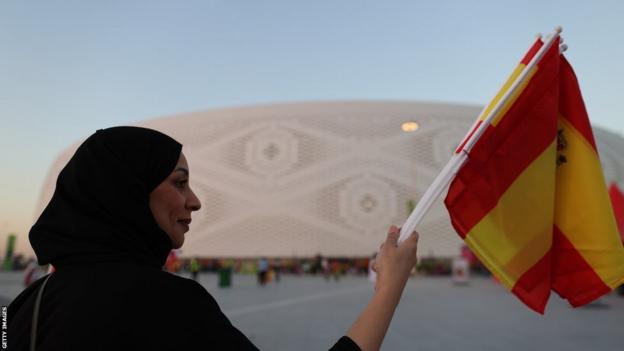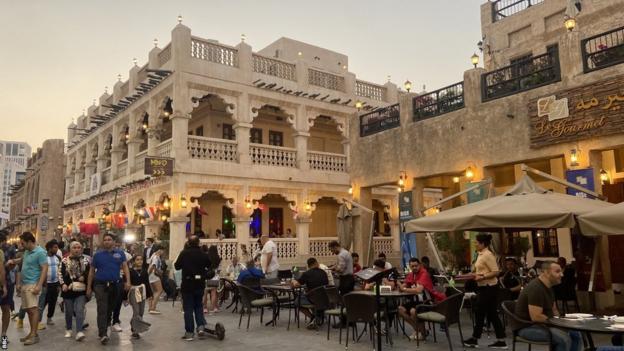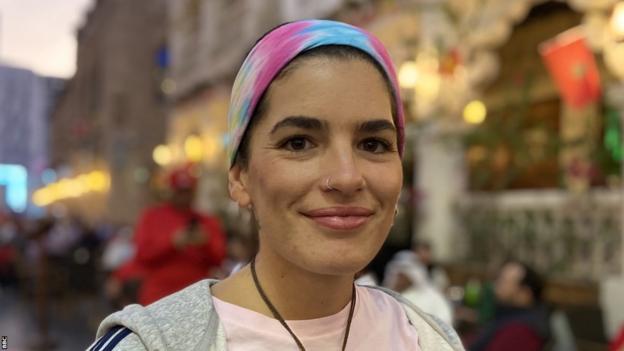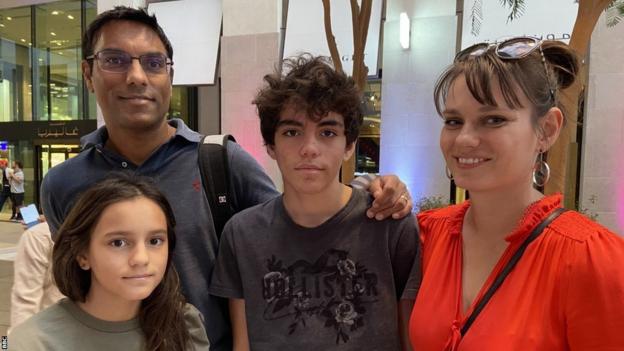
“For me as a woman on my own, it feels safer without alcohol in the stadiums. I just don’t like it when everyone is drunk.”
Bete Basica has travelled from Sao Paulo to Qatar to support Brazil at the World Cup. She’s come to Souq Waqif – the central marketplace in Doha – to buy some souvenirs before she heads home.
A huge football fan, Ms Basica writes about the game and has recently taken a football management course. She has travelled on her own for the tournament, and fondly remembers the “magical” time in her home country during the 2014 World Cup it hosted.
Speaking to the BBC, Ms Basica says the experience is very different in Qatar.
“Sometimes I’m the only woman in the metro,” she says. “I get many ‘looks’ – but that’s it.
“You read many things about [the region], that it’s very dangerous for women. But I feel respected by everyone and I had no problem being here on my own.”

The decision to hold a World Cup in Qatar has been controversial, with critics pointing to the country’s human rights record and treatment of migrant workers used to build an entire tournament infrastructure.
Female workers spoke to the Guardian about the harassment they have experienced in the hospitality industry, and a Qatari woman who lives in the UK told the BBC about the impact of religious conservatism on her mental health.
The marketplace of Souq Waqif has become World Cup fan-central. While it has always been the buzzing part of normally quiet Doha, the vibe is different now. For one, it’s much more crowded; the supporters and flags of the teams playing on any given day have tended to take over.
The restaurants are busy and the smell of shisha (hookah) mixes with that of chargrilled meat. But one thing you won’t find here is alcohol. Its sale is strictly limited and controlled here in Qatar – a conservative, Muslim country.

Just two days before the opening ceremony, it was announced that alcohol would not be sold to fans inside the stadiums, though there are specific areas in fan zones where you can drink.
Argentina fan Karen Retamal says, despite the limited access, she and her friends have been able to get a drink every day since they’ve been here – but she does prefer the dry stadiums, especially for her group.
“We’re from Argentina. We live football,” she laughs. “And when we lose, I do prefer that there’s no alcohol.”
Ms Retamal remembers how frustrated and angry fans were when Argentina lost to Saudi Arabia in their opening group match.
“When the game finished, they [Saudi fans] kept coming to us and saying: ‘Where is Messi? Where is Messi?’ We were really sad and angry,” she said.
Ms Retamal believes that had those emotions been exacerbated by alcohol, the situation could have been very tense.
However, she says she has generally felt at ease moving around between venues during the tournament.

It is a contrast to how the showpiece match of the last major men’s football event played out.
The Euro 2020 final was held at Wembley, and the disorder outside the stadium was broadcast around the world. Fans who experienced it told the BBC how unsafe they felt, and a review described it as a “national day of shame” for England.
In an attempt to avoid clashes between fans and local law enforcement, a number of British police officers were deployed to Qatar to act as “cultural interpreters” between fans and law enforcement, while Turkey and Pakistan also provided their own security.
From the start, this has been billed as a family-friendly tournament. That is evident at matches; parents with children of all ages can be seen with flags in their hands, with some in tears if their team loses. Many have said the lack of alcohol in the stadiums has contributed to the child-friendly atmosphere.

Jolanta Bhandu is Polish and has watched her team’s games with her husband Hamlesh and two children, Ben and Maya.
“We prefer the lack of alcohol, especially when we go to the stadium with the children,” she says. Most of the time, her team’s crowd is the minority, “so we’d prefer to have sober people at the stadium”, she laughs.

Francesca Ramsey, from Malta, has travelled with her husband.
“We love sports events,” says Ms Ramsey, who also went to the 2014 tournament in Brazil.
“It’s very different. Here, I feel the need to cover up more, but I don’t have a problem with that. I respect the culture.”
Ms Ramsey seems a bit disappointed by the limited access to alcohol here.
“I like to have a glass of white wine – possibly two or three,” she laughs, before adding that you do see better behaviour in the stadiums.
“We’re used to a drink. I would’ve liked a glass of wine at the stadium. It’s a time when you want to shout, scream and have a drink.”
The last-minute alcohol ban raised questions about the decision-making of football’s world governing body Fifa, and its sway – or lack of – over the host country.
But for the local population, it was seen as the country’s leadership staying true to Muslim rules and norms that the vast majority of people in Qatar abide by – and the ban may have made the World Cup more accessible for many locals, who probably would have opted out otherwise.
Despite the crowds, some fans have chosen to stay away, with the decision to stage the World Cup in a country where homosexuality is illegal heavily criticised. A transgender Qatari woman told BBC News about the fear she lives in, while Amnesty has said women in Qatar face discrimination in law and practice, with them needing a guardian’s permission for “key life decisions”.
One of the most noticeable things here has been the number of local women, especially young ones, in the stadiums – be it Qatari women or residents who have lived here most of their lives.
Salma Ahmed says one of the reasons she and her relatives have felt comfortable to go is the fact there is no alcohol.
“I wasn’t thinking about going to the stadiums before – but after the ban, I actually wanted to go,” she says.
“I’m a huge fan of football, so it’s been a great experience.”

Get the latest results and goal notifications for any team at the Fifa World Cup by downloading the BBC Sport app: Apple – Android – Amazon


Get your daily dose of Fifa World Cup reaction, debate & analysis with World Cup Daily on BBC Sounds




